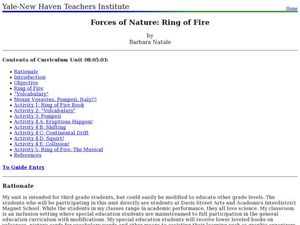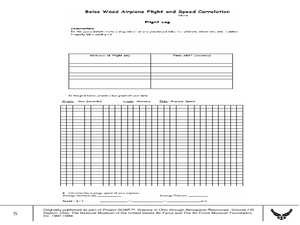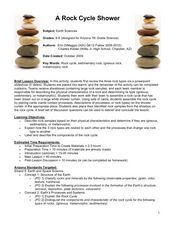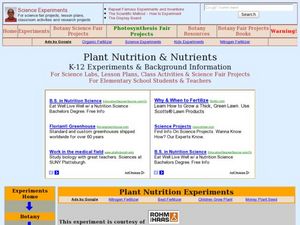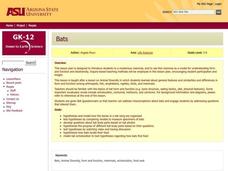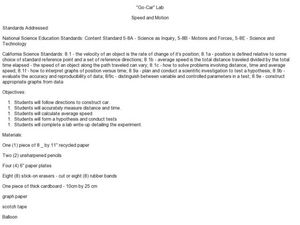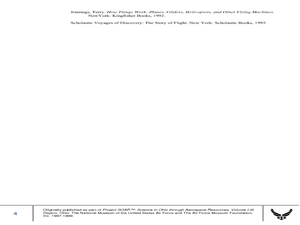Curated OER
Playing With Science
Young scientists investigate the scientific concepts and principles that help make common toys such as hula hoops, yo-yos, slinkies, and silly putty work. As a class, they read "Backyard Rocket Science, Served Wet" to get a look behind...
Curated OER
Whodunnit?
Want to create an exciting mystery activity? Investigators will identify the elements of a mystery, review mystery stories, then write their own mysteries. They engage in forensic science experiments related to mysteries and learn to ask...
Out-of-School Time Resource Center
Nutrition and Physical Activity
Emerging nutritionists explore what it means to be healthy. In the beginning of the unit, your class will examine the five food groups and learn how food gets from the farm to our plates. This leads into the investigation of...
Curated OER
Forces of Nature: Ring of Fire
Third graders will research the Ring of Fire and be able to share their findings with their partner. They will also demonstrate volcanic eruptions using a baking soda and vinegar volcano model. Then they will discover how continental...
Los Angeles Unified School District
River Systems
Scholars must react to the ecosystems of a river. They use inquiry-based learning along with maps and visuals to better understand the impact of rivers on everyday life. To finish, they create final written projects and presentations.
Curated OER
Global Warming and Hurricanes: Is an Increase in the Number of Stronger Hurricanes an Indicator of Global Warming
Ninth graders investigate whether stronger hurricanes are signs of global warming. For this environmental science lesson, 9th graders research both sides of the issue about global warming. They debate for or against this issue in class.
Curated OER
Insect Models
Learners construct an insect model. In this "insects" science and art lesson, students complete a KWL chart about 'insects," then view several interactive websites to become familiar with insect traits. Learners construct an insect model...
Curated OER
The Birds of a Feather Flock Together
Fifth graders identify all parts of an egg, and explore their importance to the life cycle of a chicken. Learners compare all sorts of birds and place them in categories based on what they look like. This five-day activity effectively...
Curated OER
Sediment Sleuths
Are you looking for a good, solid lesson on sedimentary rocks? This one, produced by the Illinois State Museum, is just such a lesson. Middle schoolers identify common rocks and minerals by analyzing sediments from local water sources....
Curated OER
Bouncing Light
Students design an experiment to investigate how light reflects. In this physics lesson, students apply the scientific method in conducting the experiment. They collect data and formulate a conclusion.
Curated OER
Balsa Wood Airplane Flight and Speed Correlation
Ninth graders calculate the average speed of their balsa wood airplane. In this physics activity, 9th graders build their own airplane and make necessary modifications to to make it fly straight. They interpret distance and time graph...
Curated OER
Making a Battery
Fifth graders make a battery. In this physical science lesson, 5th graders word in pairs make the battery. Students follow 4 steps to create the battery.
Curated OER
A Rock Cycle Shower
Students classify rocks as sedimentary, igneous or metamorphic based on physical properties. In this earth science instructional activity, students recreate the rock cycle using a set of stones placed on labeled shower curtain. They...
Curated OER
Plant Nutrition and Nutrients
Students observe seeds growth and examine the different parts of the seedling. In this biology lesson, students compare the growth of seeds planted in soil and in hydroponics. They record their observations in their science journal and...
Curated OER
Cardiovascular Disease and Fitness: Exploring the Rhythm of Your Pulse
Students explore several examples of cardiovascular diseases. In this anatomy lesson, students explain why physical fitness is very important. They count their pulse rate and record them on a data table.
Curated OER
Scientific Inquiry: Periodic Motion
Young scholars construct their own pendulum. In this physics lesson, students design an experiment to find the factors affecting its period. They formulate a conclusion based on experimental data.
Curated OER
Bats
Students model how the bones in a bat wing are organized. They develop questions about bat body parts based on photographs. They hypothesize how bats locate their food.
Curated OER
Hero Or Zero?
Learners investigate science and technology by reading a children's book. In this reading comprehension lesson, students read the story Archibald Frisby and discuss the ways we use science and technology in everyday life....
Curated OER
Electric Field Mapping in 3D
Students create a 3D vector field map of an electric field. In this physics lesson, students measure the voltage inside an aquarium with water. They present their findings and map to class..
Curated OER
Exploring Mars
Learners, working in small groups construct scale models of the planets and solar system. They examine images of Mars and discuss what might have caused the features. They record facts about their planetary research in their journals and...
Curated OER
"Go-Car" Lab
Students construct a car based on directions given. In this physics lesson, students calculate average speed using distance and time information. They collect data and create a graph of distance vs. time.
Curated OER
The Science of Papermaking and Paper Recycling
Students practice bleaching recycled fibers. Using colored copy paper, they cut it into strips and put it in a blender with water. They filter the pulp and stir in the bleach. They compare the original paper with the bleached sample...
Curated OER
The Wonderful World of Waves (Wave Basics)
Young scholars define amplitude, wavelength, frequency, and period, calculate period given frequency, and calculate frequency given period, define crest and trough and locate both on diagram of wave, differentiate between latitudinal and...
Curated OER
Parachutes: Is it Surface Area or Shape?
Students investigate how to make a good parachute. In this physics lesson, students observe the motion of parachutes as it falls and measure the time. They collect data and calculate the average descent time for each canopy shape.



